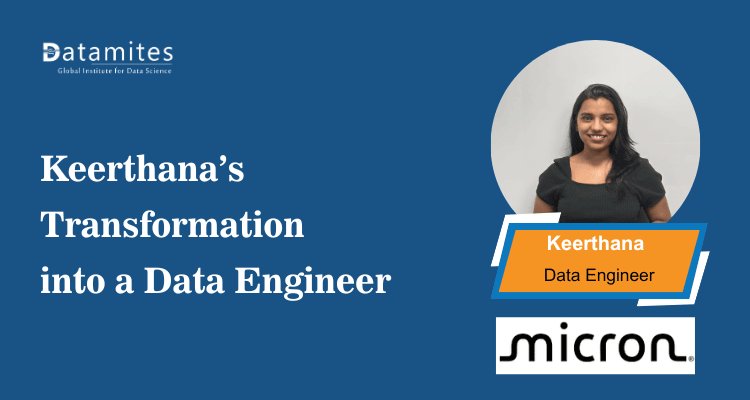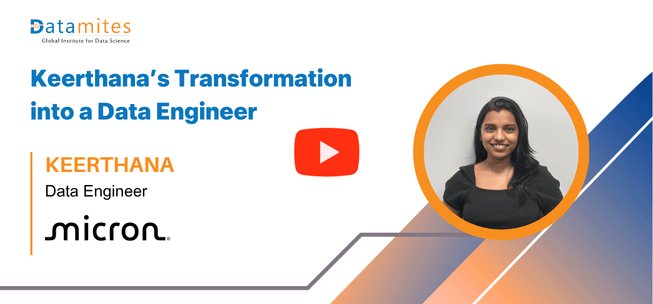Keerthana’s Transformation into a Data Engineer
Keerthana transitioned from a non-technical background into a data engineering role by building strong coding skills, mastering data tools, and tackling real-world projects. Her journey shows how persistence and focused learning can open doors in tech.

Breaking into tech can feel like staring at a mountain, especially when you're starting from different background. But Keerthana’s story proves that with curiosity, smart choices, and the right support system, it’s not only possible, it’s a path others can follow.
Now a full-time data engineer at Micron, Keerthana’s journey is a reminder that non-traditional paths can lead to real opportunities in tech. If you're figuring out how to break into the field from a different background, or need a nudge to start, her experience is both relatable and practical. Want more stories like this? Watch DataMites success stories and see how others have carved their own way into data careers.
Keerthana’s Journey into Data Engineering with DataMites
Keerthana transitioned from curiosity to career by diving into DataMites data engineering course, and came out with the skills to land a job she once thought was out of reach.
Q1: Let’s start with your background. What did your path into data engineering look like?
I graduated in 2022 with a degree in Electronics and Instrumentation Engineering. Even though my academic background wasn’t in computer science, I was curious about data science. I started exploring Python and SQL in my second year. During COVID, I had extra time, so I began learning online and eventually found DataMites through a friend.
That’s when things got serious. I joined their internship program, which lasted about 3–4 months. It wasn’t just theory, we worked in teams, built four AI-related capstone projects, and even did a final review project on customer churn prediction. That hands-on work gave me real experience beyond just watching tutorials.
Q2: You skipped the formal training and jumped straight into the internship. How did that go?
Exactly. I didn’t attend the training sessions because I had limited time during summer vacation. I just went straight into the internship, which was remote. Even so, I got access to training materials and PDFs covering SQL, Python, AI models, and math fundamentals. Whenever I had doubts, I used their support platform, Deep Tribe, to ask questions. It worked out well.
Q3: Were you already familiar with Python before starting the internship?
Somewhat. I had a basic understanding from practicing on platforms like LeetCode. But Python for data science is a different ball game. I learned about libraries like Pandas, NumPy, and visualization tools only after starting the projects. Those practical needs pushed me to learn quickly.
Q4: How did you balance learning machine learning concepts during the internship?
I dedicated my summer break entirely to it. Each capstone project required a deep dive, not just into the code, but into the theory too. Our team split tasks to cover more ground. We had regular internal sessions to share what we learned. That collaboration really helped, especially when we were figuring out which models to use or understanding how to tune them.
Q5: What was the interview process?
Long and thorough. The whole thing took around 6 hours (with breaks) and had multiple rounds: online coding tests, technical interviews, and an HR round.
They focused a lot on Python, data structures, and problem-solving. They also asked about the projects I did at DataMites, what libraries I used, how I approached problems, and how I collaborated with others.
They weren’t just looking for right answers, they wanted to see how I think, how I approach a challenge.
Q6: What does your current role at Micron involve?
I'm a data engineer working mostly with Python, SQL, and Google Cloud Platform (GCP). We build ETL pipelines, basically, extracting raw data, transforming it into something usable, and loading it into the cloud.
Our company manufactures memory chips, so the raw data we get isn’t pretty. We clean and structure it so the data science team can use it for analysis and modeling. We also build APIs in some cases. I don't directly work as a data scientist, but we collaborate closely.
Q7: What core skills should someone master to become a Data Engineer?
Here’s what matters most:
- SQL – This is your bread and butter.
- Python – You’ll use it every day for scripting, building pipelines, and sometimes APIs.
- Cloud Platforms – GCP, AWS, or Azure. You don’t need all three. Knowing one deeply is enough.
- DSA (Data Structures & Algorithms) – Not just for interviews. Helps you think and structure problems better.
If you're aiming for data science later on, add machine learning models, math, and LLMs (Large Language Models) to your toolkit.
Q8: Is it harder to become a Data Engineer or a Data Scientist?
They’re not harder or easier, just different. Data Engineers work with raw data, build pipelines, and structure it for data scientists. Data Scientists build models and extract insights. Both roles require different strengths.
If you focus on mastering the right skills for your role, neither is too difficult. The confusion usually comes when people try to do both without a clear direction.
Q9: Can you recommend a project idea for aspiring Data Engineers?
Look into ETL projects using cloud platforms. Pick a cloud (like GCP or AWS), extract data from one source, transform it, and load it into a warehouse like BigQuery or Snowflake. Add a FastAPI layer if you want to show API integration.
You don’t need anything complex. Just show that you can build, structure, and deliver clean data.
Q10: How can a background in data science help someone land a Data Engineering job?
It helps if you’ve done hands-on work with data. Python experience is useful across both fields. In my case, having built models and understood data flows during the DataMites internship gave me an edge in interviews.
But make no mistake, cloud, pipelines, and SQL are must-haves for data engineers. Data science experience can support that, but it’s not a replacement.
Lessons from Keerthana’s Bold Move into Data Science
Her journey shows how the right training and clear direction can turn a career shift into a success story.
- Keerthana studied Electronics and Instrumentation but built her data engineering career through self-learning and internships.
- She started with basic Python during college (via LeetCode) and built on that foundation with data-specific libraries like Pandas and NumPy.
- The internship at DataMites gave her exposure to real-world projects, like churn prediction, and forced her to apply theory, collaborate, and problem-solve.
- She didn’t attend DataMites’ live sessions but still succeeded by using their study materials and support platform (Deep Tribe) to fill in gaps.
- During the internship, she and her teammates divided topics, held discussions, and helped each other understand machine learning concepts and model tuning.
- Her 6-hour Micron interview process tested not just Python and DSA, but also her thought process, problem-solving, and project experience.
- These are the core data science tools she uses every day to build and manage ETL pipelines at Micron.
- Engineers build the infrastructure; scientists build models. Don’t try to do both at once unless you’re clear about your direction.
- Her ML experience from DataMites helped in interviews but wouldn’t have mattered without strong Python, SQL, and cloud skills.
- A good beginner project: build an ETL pipeline using a cloud platform (like GCP or AWS), and optionally expose it with an API using FastAPI.
If Keerthana’s story strikes a chord, this might be the right moment to dive into Data Science, one of tech’s most dynamic and fast-expanding fields. The global data science platform market is expected to grow from USD 15.2 billion in 2024 to a massive USD 144.9 billion by 2033, according to IMARC Group. Data is becoming central to how industries operate, and there’s a growing need for people who know how to work with it. Taking up a high-quality offline Data Science trainig in Hyderabad, Bangalore, Chennai, Pune, Mumbai, or Delhi can give you a serious edge in a competitive job market.
Keerthana, who came from a Computer Science background, decided it was time to double down on a data-focused career. She enrolled in the Certified Data Scientist program at DataMites institute, where she developed hands-on skills in Python, SQL, Machine Learning, Statistics, and Data Analytics. Through a mix of offline classes, consistent practice, and real-world projects, including a lead scoring capstone, she built the confidence and capabilities to step into the field. Her certifications from IABAC and NASSCOM FutureSkills gave her profile an extra boost.
Whether you're starting from scratch or switching tracks, DataMites offers flexible learning formats, offline, online, or blended data science institute in Pune, Bangalore, Chennai, Hyderabad, Coimbatore, Ahmedabad, and Mumbai. Thousands have already made the leap with them.
If you're in Telangana and aiming to build a career like Keerthana’s, a Data Engineer course in Hyderabad can equip you with practical skills, real-world projects, and expert guidance to launch your journey.
For those based in Maharashtra, the Data Engineer course in Pune delivers the same industry-aligned curriculum and career support to help you break into the data field with confidence.

